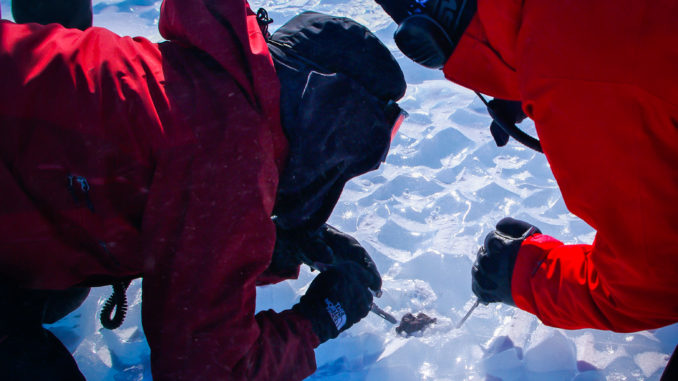
Press release written by Université libre de Bruxelles
Two scientists cutting up a meteorite submerged under the ice, a laborious task compared with collecting most samples directly from the surface. Photo taken during the 2009-2010 JARE-51 field mission to Balchenfjella, Antarctica. Credit : Steven Goderis, Vrije Universiteit Brussel.
Global warming results in the dissapearance of meteorites, and as such reduces our access to extraterrestrial material. A team of researchers, involving researcher from Institut des géosciences de l’environnement and co-led by ULB and its Laboratoire de glaciologie, publishes a study in Nature Climate Change on this unexpected impact of climate change, which is hampering our knowledge of the solar system.
Antarctica harbors numerous large meteorite concentrations at its surface, and as such, the icy continent contains an unparalleled wealth of information on our Solar System, enabling us to understand, for example, the emergence of life on Earth, and how the Moon was formed.
A study carried out by scientists from the Université Libre de Bruxelles, ETH Zurich, WSL Birmensdorf and Vrije Universiteit Brussel highlights a rapid disappearance of meteorites due to global warming, a loss with far-reaching consequences for our understanding and knowledge of extraterrestrial life.
Using artificial intelligence to combine satellite observations of the continent with climate model projections, the scientists calculate that for every tenth of a degree of increase in global air temperature, 5,100 to 12,200 meteorites are lost from the surface of the ice sheet. By 2050, about one quarter of meteorites will be lost, and this can rise to three quarters by the end of the century, depending on future greenhouse gas emissions.

Veronica Tollenaar, PhD researcher (FNRS) at the Laboratoire de Glaciologie (GLACIOL), Faculty of Science – ULB, who co-led the study explains thateven when temperatures of the ice are well below zero, the dark meteorites warm so much in the sun that they can melt the ice directly under the meteorite. Through this process, the warm meteorite creates a local depression in the ice and over time fully disappears under the surface. As atmospheric temperatures increase, the surface temperature of the ice increases, intensifying this process, since less heat from meteorites is required to locally melt the ice.”
To date, it is estimated that at least 300,000 meteorites remain at the surface of the Antarctic ice sheet. The study reveals that due to the currently ongoing warming, each year about 5,000 meteorites are lost, outpacing the pace at which Antarctic meteorites are collected by a factor five.
Harry Zekollari, Department of Water and Climate (VUB) and Laboratoire de Glaciologie (ULB) who co-lead the study, urges the need for a major international effort : To secure this invaluable
extraterrestrial material, we need to intensify and coordinate the recovery of Antarctic meteorites
before we lose them to climate change. In similar efforts as collecting ice cores from vanishing glaciers
or sampling coral reefs before they bleach, our study identifies the loss of meteorites as an unexpected
impact of climate change upon which we need to act.”
Christoph Kittel, IGE researcher, concludes Scientific research on the future of Antarctica focuses mainly on assessing the impact of global warming of the cap on our regions, in particular its contribution to sea level rise. However, this study shows once again that climate change is not limited to tangible consequences such as sea-level rise or altered biodiversity. They can also have more abstract repercussions, such as the exploration of our universe through meteorite research.”
Reference
Tollenaar, V., Zekollari, H., Kittel, C. et al. Antarctic meteorites threatened by climate warming. Nat. Clim. Chang. 14, 340–343 (2024). DOI : 10.1038/s41558-024-01954-y

Leave a Reply